|
Untitled Page
ARCHIVED FORUM -- April 2007 to March 2012
READ ONLY FORUM
This is the first Archived Forum which was active between 17th April 2007 and
1st March February 2012
Latest post 11-27-2010 11:35 PM by Søren Mexico. 103 replies.
-
-
 classic
classic
 
 - Joined on 04-16-2007
- Venø - Struer / Denmark
- Posts 224

|
Re: Grand Prix Moderne Stereo 609
Hi Martin,
I understand your point of using the capacitors, but .......
Have a look here if you need the capasitors with the dimension of the original.
http://www.svalander.se/shoppen/multilytar.htm
I enjoy very much your work.
/Frede
Beolab 5000 - "If another amplifier sounds different then it needs repair!"
|
|
-
-
 Dillen
Dillen
  - Joined on 02-14-2007
- Copenhagen / Denmark
- Posts 5,008

|
Re: Grand Prix Moderne Stereo 609
Hi Frede,
Thanks for your input, greatly appreciated ! 
Funny you should find those, I did look at these:
http://www.thevintagesound.com/store/jj-100uf-100uf-500v-can-cap-p-736.html
http://www.tubeampdoctor.com/english-store/100-100uF-500V-35x80mm-cap-can-clamp-mount-pid-499.htm
one of them being the exact same cap as the one you showed (but at another price)
and the other being the one I actually ordered - looked a nice component to have in stock just in case. 
My initial thought was that it would look too new and I would prefer to keep the
old one in its holder for looks, even if stuffed with modern innards but I know
that for some capacitors and maybe other components on the main chassis I won't be able
to keep the original appearance so it's a bit 50/50.
But, as said, I have ordered some of the above caps and will consider this alternative again when
they arrive in a few days.
Positive words mean a lot, especially when coming from a classic B&O specialist like you. 
Martin
|
|
-
-
 classic
classic
 
 - Joined on 04-16-2007
- Venø - Struer / Denmark
- Posts 224

|
Re: Grand Prix Moderne Stereo 609
Hi Martin,
I will admit I normaly replace components like the capacitor in your power supply after the priority, mechanical dimensions the same, if not possible I try to find parts with the same diameter. This means I can keep a high degree of originality and still have the capacitors replaced. I need no extra holes or other mechanical changes of the classic products.
/Frede
Beolab 5000 - "If another amplifier sounds different then it needs repair!"
|
|
-
-
 Dillen
Dillen
  - Joined on 02-14-2007
- Copenhagen / Denmark
- Posts 5,008

|
Re: Grand Prix Moderne Stereo 609
Frede,
Yes, and I will definitely keep that as an option.
After all, the capacitor is mounted horizontally, facing its solder tags
towards the back, so its housing won't be that much visible through the holes in the rear panel.
Martin
|
|
-
-
 Dillen
Dillen
  - Joined on 02-14-2007
- Copenhagen / Denmark
- Posts 5,008

|
Re: Grand Prix Moderne Stereo 609
Work can continue on other fronts while we wait but not a lot happened today;
The cabinet had a split at one end.
It was gently opened and cleaned off as much of the old glue as was
possible. Fresh woodworkers glue was added and the cabinet was clamped
tight and left for the glue to set overnight.
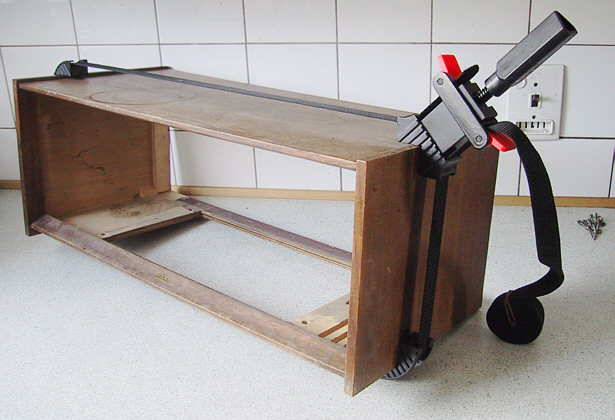
Martin
|
|
-
-
 tournedos
tournedos
  - Joined on 12-08-2007
- Finland
- Posts 5,808

|
Re: Grand Prix Moderne Stereo 609
I have that exactly same clamp! 
Proved invaluable when fixing my Beomaster 2000's (the 1970's model)...
|
|
-
-
 Dillen
Dillen
  - Joined on 02-14-2007
- Copenhagen / Denmark
- Posts 5,008

|
Re: Grand Prix Moderne Stereo 609
 Biltema, I think. wonderful tool ! Biltema, I think. wonderful tool !
Not a lot happened today either but the main chassis is now on
the bench. Even if my intention was to attack the snapped dial
string for the rotating AM antenna, a tiny detour was taken although still
headed in the right direction.
To get to the dial string pulley on the knob spindle, the whole dial will
have to come off. It's held by four screws and since the spindles for the
knobs go through the dial glass, the knobs will also have to come off.
This is a great opportunity to get them all cleaned so all knobs and buttons
were dismounted and soaked for a couple of hours in handwarm soapy water.
Then cleaned using a dedicated toothbrush, rinsed in running water and dried.

Martin
|
|
-
-
 Dillen
Dillen
  - Joined on 02-14-2007
- Copenhagen / Denmark
- Posts 5,008

|
Re: Grand Prix Moderne Stereo 609
The dial also received a good clean. Looked like it never had it's inner side
cleaned. And this is where I just have to give a warning;
Don't clean the printed side of a dial unless you are absolutely sure that
what you do won't hurt the lettering. In many cases, the lettering will wash off,
leaving only a shiny blank piece of glass...
The Grand Prix has a perspex dial and it will withstand a gentle wipe with
a moist cloth, enough to remove most of the dirt and dust accumulated here.
A lot in this case !
Now we have a nice dial and clean knobs. Two of the round "knobs" are the lamp
holder caps, they have a slight discoloration from the lamps heat. Nothing we
can do about that and it's not a huge problem. They do not sit close to other
knobs so it's not that obvious and it does show worse in the sharp light
and the photo than in real life.
Still missing one knob, hopefully I will find one soon.
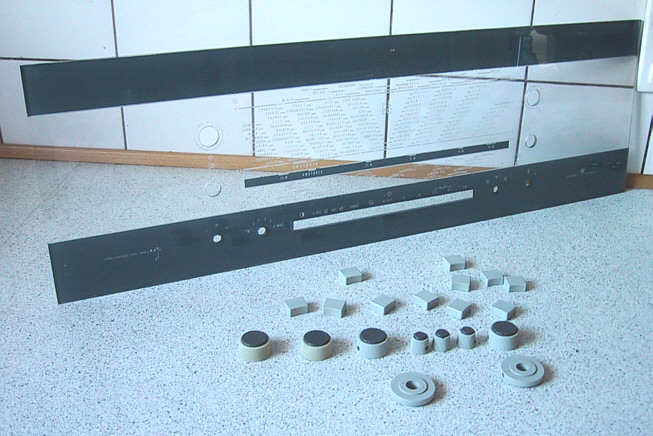
Martin
|
|
-
-
 ipaul
ipaul
  - Joined on 04-22-2007
- Posts 378

|
Re: Grand Prix Moderne Stereo 609
On the knobs: this really, really, really is a challenge: you're already lucky if they're not cracked as it is plastic with no bushing inside, and finding spares seems next to impossible....
I ended up buying a 60-something B&O radio only for the knobs (as i have a Dirigent missing 2 or so).
On the AF (Germanium) transistors: recently i read an article on this ''hair'' problem but don't trhrow them away for this: it is repairable !!
I think this guy opened them and cleaned the inside, but also read something about applying a high(er) tension somehow and burn the hairs leaving an ok transistor. (you may find some more about this on the internet).
|
|
-
-
 Dillen
Dillen
  - Joined on 02-14-2007
- Copenhagen / Denmark
- Posts 5,008

|
Re: Grand Prix Moderne Stereo 609
Thanks for your input, Paul.
The AF114-117 series seems most prone to short, typically from the screening pin (housing) to one of
the other internal connections or the germanium chip itself.
Let's put on blue glasses and a nerd cap and dig deeper... 
It's correct that in some cases, you can cure a transistor with this fault by "zapping" it with a current running from the screening pin
to the other pins connected together. The shorting whisker will burn but it's just a matter of time before another whisker reaches
something inside. Sometimes tapping the transistor will make it work intermittently as the whisker touches or disconnects from
the vibrations.
In most cases, a BF450 transistor will work fine as a direct substitute for any shorted AF transistor within
this range.
I know, I know.. The BF450 is a silicium transistor rather than a germanium and it's operating voltage specs
are different. BUT, it does seem very happy about the AF114-117 conditions and will often work wonderfully without
changing anything else.
Another solution is the AF125/126 which can still be bought some places, they don't seem prone to this failure.
Mounting another AF114-117 is also a short lived solution. Any transistor within this range will be prone to failure regardless
of being used or new old stock (unused).
About the tin whiskers growing from pure tin surfaces, you can read more about it in this
NASA document where the strange (and yet unexplained) phenomenon was examined by NASA on behalf
of the UK Vintage Radio forum owner Paul Stenning:
http://www.vintage-radio.info/whiskers/
http://nepp.nasa.gov/whisker/reference/tech_papers/2006-Leidecker-Tin-Whisker-Failures.pdf
Martin
|
|
-
-
 Dillen
Dillen
  - Joined on 02-14-2007
- Copenhagen / Denmark
- Posts 5,008

|
Re: Grand Prix Moderne Stereo 609
First things to fix on the main chassis will be the snapped dial string and
that no-good fuse holder.

Martin
|
|
-
-
 Dillen
Dillen
  - Joined on 02-14-2007
- Copenhagen / Denmark
- Posts 5,008

|
Re: Grand Prix Moderne Stereo 609
The fuse holder practically fell apart in my hands and new clamps were mounted
similarly to the two holders on the power supply chassis.
Much better.
I measured around a bit but couldn't find any obvious reasons for the fuse
to blow but we're not done yet so maybe something will come up.
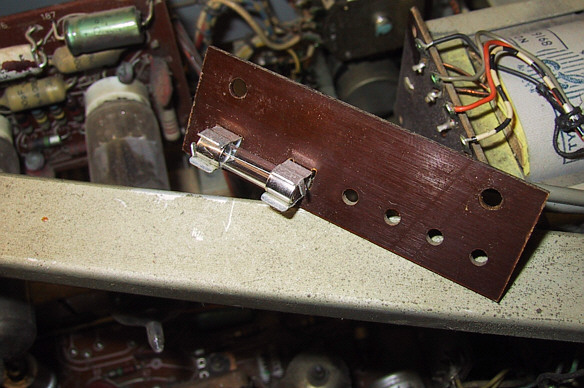
Martin
|
|
-
-
 Dillen
Dillen
  - Joined on 02-14-2007
- Copenhagen / Denmark
- Posts 5,008

|
Re: Grand Prix Moderne Stereo 609
Back to the snapped antenna string.
Restringing things like this is not for people with a tough temper.
Keywords are patience, masking tape and strong coffee.
The reason the string had snapped was soon clear in that the rotating antenna
had completely seized at it's rotational support.
This was taken apart, cleaned, a little fresh silicone grease added and it
was put back together. The screw holding it to the crossbar received a tiny
drop of loctite to keep it tight while the rest rotates around it.
Now the antenna rotates freely.
A couple of flexible leads connect to the coils on the rotating ferrite rod. A support
is provided for these leads in the form of a little piece of nylon (or
maybe plastic) with tiny cutouts to hold the leads. This is to prevent the
leads from interfering and catching on things as the antenna is rotated.
The plastic piece is held to the chassis crossbar with a long screw and a
small brass tube to provide a bit of distance.
The plastic piece had broken where the screw goes through it. This was an easy
fix with a drop of glue and tightening of the screw.
The remains of the old dial string will often reveal the strings original path,
especially if the set stood unused for a long time. The string simply takes the
shape of the wheels and pulleys, telling where corners, bends and straight lines
are to be expected. This is often a great help in cases where a manual or
some other kind of reference can't be found.
This particular run of string is not very complicated and there's no need
for any exact calibration. The knob is able to rotate apprx 7/8 of a turn and
the antenna should just be able to follow that.
I am lucky enough to own the original servicemanual which gives the string lengths
and paths.
I started with the knob pulley, following the manual, looping around the tap on
the pulley and then each end about 3/4 of a turn around the pulley. This way, the string
will be kept tight even in the extreme outer positions.
What is not visible in this photo is that both lose ends of the string are held
by masking tape to the chassis in suitable positions.
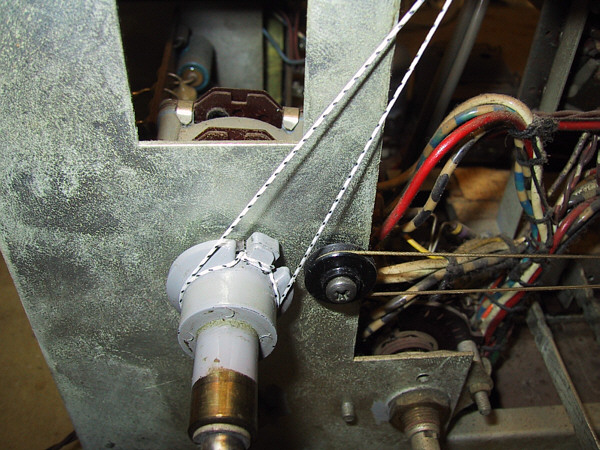
Martin
|
|
-
-
 Dillen
Dillen
  - Joined on 02-14-2007
- Copenhagen / Denmark
- Posts 5,008

|
Re: Grand Prix Moderne Stereo 609
A bit higher up, the string(s) pass a captured nylon bushing.
It does not rotate and is not supposed to either. The strings simply slide
over - and around - it to convert a vertical pull to a horizontal.
Still held by masking tape at the ends.
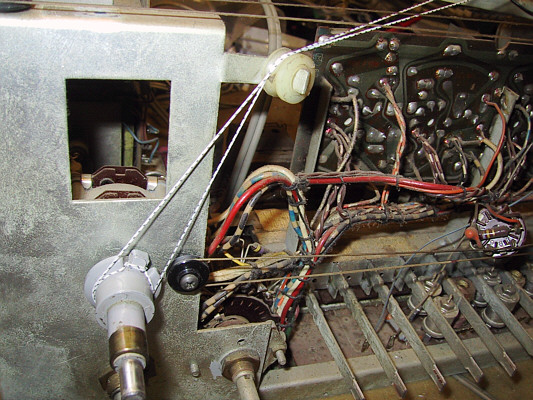
Martin
|
|
-
-
 Dillen
Dillen
  - Joined on 02-14-2007
- Copenhagen / Denmark
- Posts 5,008

|
Re: Grand Prix Moderne Stereo 609
On to the antenna clamp which also has a groove for the dial string.
This view also shows the antennas rotational joint and the leads plastic
holder as decribed above.
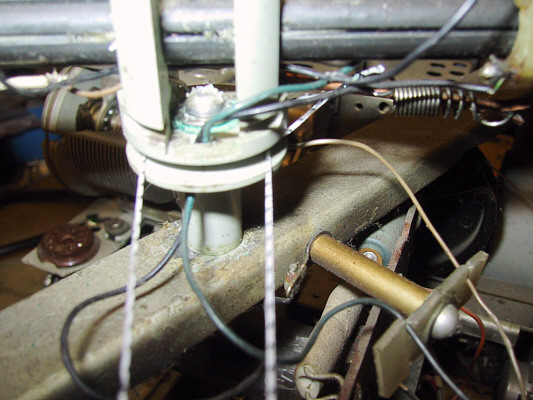
Martin
|
|
-
-
 Dillen
Dillen
  - Joined on 02-14-2007
- Copenhagen / Denmark
- Posts 5,008

|
Re: Grand Prix Moderne Stereo 609
Around the antenna holder, each end of the string goes around about 3/4 of a turn,
before meeting up at the spring on the pin sticking out of the side
of the holder. Mark the strings where the knot goes to make a tight
connection without too much string stress.
Take off the dial string again, tie the knot on the spring,
rotate both the knob and the antenna to a matching extreme position and
mount the string.
A little (black) superglue was added to the knot on the spring to prevent
the knot from working itself lose.
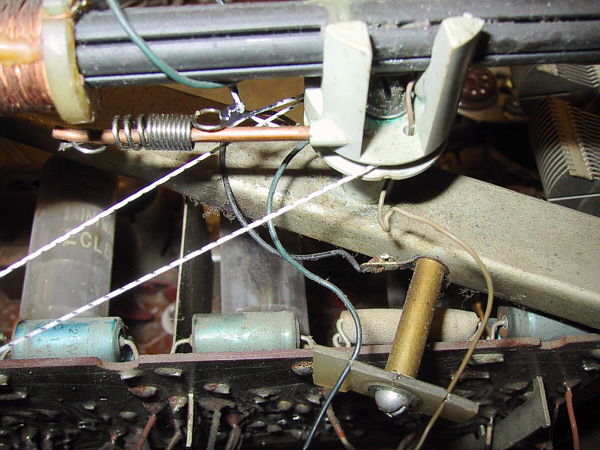
Martin
|
|
-
-
 Dillen
Dillen
  - Joined on 02-14-2007
- Copenhagen / Denmark
- Posts 5,008

|
Re: Grand Prix Moderne Stereo 609
Now's a good chance to get that dusty-blue dial background plate cleaned too.
It's supposed to be dusty-blue but not quite as dusty as this particular one.
The blue capacitors on the amplifier boards were next.
They were desoldered from the board and checked.
A bit of a tricky thing to do now with the new dial string in place. It's path
is directly above the amplifier board and it will only take one touch of the side
of the soldering iron to snap a string. Slow motion and a
steady hand is what it takes.
Had I thought about it, I would have done the caps before mounting the dial string.
Anyway, none of the caps tested very bad and the dark patch on one of them
turned out to be nothing but dust and dirt accumulated here but still
they were replaced with modern 105deg axial types to guarantee good performance
for years to come.
The original caps were only 85deg types and still did surprisingly well despite
their age and warm location directly above the output valves.
It will be quite warm there when the music is playing.
BTW; What an amplifier this is !
Definitely one in the upper range.
No less than 4 output valves (plus phase shifter)
2 pcs of ECL86 in each channel arranged as a push-pull output stage.
This would have been quite impressive for a living room sound system and
it is definitely going to sound good and have a lot of power.
A funny thing in these energy-focused days is that a valve amplifier like this
does not consume more energy when playing louder. At least not significantly more
in that the valves are operating in something that can be compared to the
transistor class A, drawing the same amount of DC current at all times, regardless
of the volume setting and programme content.
So playing louder won't make any difference to your electric bill.
- With a rated power consumption of 115 Watts, it will be high regardless.
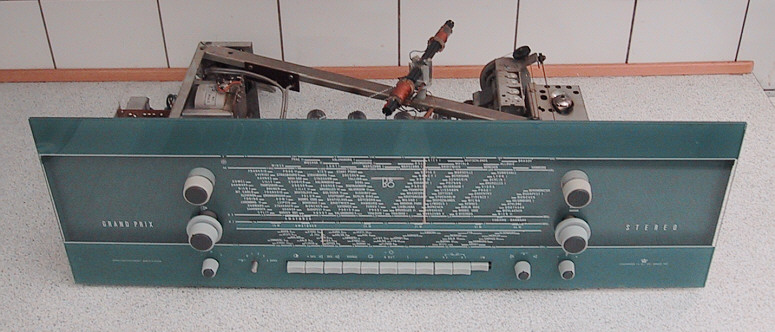
Martin
|
|
-
-
 Dillen
Dillen
  - Joined on 02-14-2007
- Copenhagen / Denmark
- Posts 5,008

|
Re: Grand Prix Moderne Stereo 609
- Anyway, some of the money will be saved on central heating. 
A couple of capacitors on the main board looked a bit sorry for themselves.
One had leaked it's contents onto the main board and, when dismounted, measured
completely open circuit. New caps were mounted.
A lot of measuring about didn't reveal anything amiss and a reason for an eventual
blown fuse never showed.
No doubt, this thing is now, if not working, then at least safe to power up
and we are closing in on doing exactly that.
The new high voltage (500 Volts) capacitors, I ordered, arrived and I
decided to mount one of these on the power supply chassis instead of the
two "extra" ones I did earlier.
The new capacitor didn't fit directly into the bracket, it was too narrow but
two rounds of high quality black 3M electric tape solved this and it's a good and
tight fit now.
The flexible joint introduced for the filter resistor was preserved.
This set will have to find a new owner when I'm done and I will do whatever
possible to prevent future problems.
The old capacitor had its negative tag connected to the aluminum case which, via
the holding bracket, connects directly to the metal chassis. Since the new
capacitor has a pvc sheathing, this connection is now lost and I had
to verify that it still existed within the rest of the circuit - which
it did - so no worries here.
If it didn't exist, I would have had to introduce a connection by f.e. running
a piece of wire from the capacitors negative solder tag down to
a chassis grounding tag somewhere.
Thanks Frede for helping me decide on this solution. Maybe not visually reversible
but a neat result none-the-less.
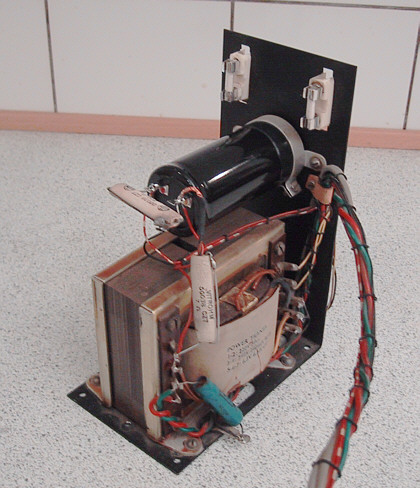
Martin
|
|
-
-
 Dillen
Dillen
  - Joined on 02-14-2007
- Copenhagen / Denmark
- Posts 5,008

|
Re: Grand Prix Moderne Stereo 609
Time for the first power up.
On the work bench, a couple of voltmeters attached to critical points on the two
chassis', one measuring the voltage on the (second) filter/reservoir
high voltage capacitor, the other one is on the anode of an output valve.
The dial lamps were replaced with new ones, so will tell if that
voltage is present.
A pair of speakers connected, optimistically, to the output sockets.
Mains plug connected to a B&O RT12 variac.
Workbench cleared.
FM depressed and mains voltage slowly increased to about 20 Volts or so.
Check the current on the variac, - almost zero.
Check the voltage on the reservoir cap. Looking fine.
Increase to 80 Volts or so. Mains current draw moved up ever so slightly.
Sniff around for signs of hot components. Nothing seems amiss.
Increase mains again to apprx 150 Volts.
Valves started glowing a bit now and the dial lamps have started to show
signs of life - good signs !
Both voltages look fine and the mains amperemeter have started to move a bit.
Increase mains to 180-200 Volts. The magic eye has started to light up it's
magical surface.
The well-known scent of warm dust was noted now.
In this case the smell comes mainly from the four output valves which also
have started to draw current. The voltmeter on the valve anode tells me
the voltage here is dropping - good so far !
Without a warning, suddenly the speakers started hissing.
I had kept one finger on the OFF button on the variac all the time and that
button was duly pressed. The sound disappeared and I sat back and wondered for
a few seconds.
That was when it hit me that the sound wasn't a bad sign but simply FM static
coming through at a somewhat loud volume setting.
I don't know what I had expected but I've been fooled before years ago
when a set was brought up with the Phono button depressed and strangely enough
wouldn't produce a sound until the mistake was discovered and it burst
into life with a cloud of dust from the speaker cone and the cat leaving in a hurry.
I think all radio restorers have been there.
Anyway, the hissing was to be expected but its sudden presence rather than
sneaking appearance, came as a bit of a suprise.
It's normal to hear a slight humming from the speakers as the circuits of
a valve set are "balanced" into their normal working conditions, voltages
settled etc. but not here. The sound just came out of nowhere, reminding me that this
is not an everyday, cheap, run-of-the-mill set.
Power up again, carefully but all the way up to 220 Volts this time.
230 Volts is standard for Denmark now, it was 220 Volts when the radio was made
so we'll start with that.
The hissing came just as suddenly as before and I noticed it being of equal
volume in both speakers. The hissing could be manipulated using the volume
and balance controls so we have both output amplifiers doing something and
the tonecontrols working fine too.
The FM dial was travelled - nothing but static.
After about one minute or so, the set started to crackle a bit from the speakers.
I quickly made sure that the crackling sound came from both speakers so would have
to be from a common source.
Oh yes, I had decided to do so but I forgot to clean the valve pins and sockets.
Did that and powered up again.
Travelled the FM dial again, finding nothing but static.
Inserted one meter of wire into the FM antenna socket.
Travelled the dial once more and found ---
--- A station !
Drowned in noise and there was only that one station. A local one.
I can see the transmitter out the window of my house, only 2Km
away and apprx the same distance from my repairshop so I wasn't very impressed
but not disappointed either.
Surely, this hefty 11-valve (plus two transistors and a handful of diodes)
construction should be able to do better than this.
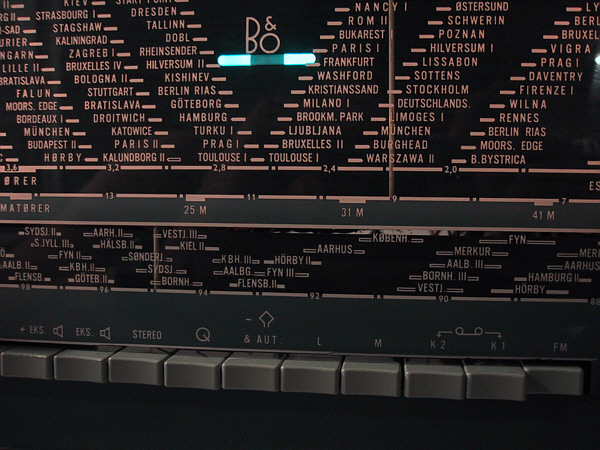
Martin
|
|
-
-
 tournedos
tournedos
  - Joined on 12-08-2007
- Finland
- Posts 5,808

|
Re: Grand Prix Moderne Stereo 609
 Dillen: Dillen:
The FM dial was travelled - nothing but static.
After about one minute or so, the set started to crackle a bit from the speakers.
I quickly made sure that the crackling sound came from both speakers so would have
to be from a common source.
Oh yes, I had decided to do so but I forgot to clean the valve pins and sockets.
Did that and powered up again.
Travelled the FM dial again, finding nothing but static.
Inserted one meter of wire into the FM antenna socket.
Travelled the dial once more and found ---
--- A station !
Reminds me of when I had the radio from my 1962 Cadillac on the workbench (never worked before, later turned out to be just a bad fuse holder in the car). It has as I recall five 12V miniature valves and a germanium power transistor as the audio amplifier. I got the hiss and was a little excited already, then realized I'm not going to find anything without an antenna... I stuck a length of loose wire into the antenna socket, pressed the automatic search bar, finally the dial stopped and I got a Finnish tango from the '60s on the speaker! That was a magical moment 
|
|
-
-
 Dillen
Dillen
  - Joined on 02-14-2007
- Copenhagen / Denmark
- Posts 5,008

|
Re: Grand Prix Moderne Stereo 609
Wow, driving around in a 1962 Cadillac, playing finnish tangos, doesn't get any better ! 
Nice car ! 
Let me note that the white streaks on the top part of the FM dial are
not scratches to the dial but merely ambient light shining down onto the
chassis from above, visible through a clear part of the dial where the
pointer moves. Normally, with the chassis in place in the cabinet, it will be pitch dark
inside and the dial will look fine.
With nothing but that one single FM station and a magic eye standing frozen,
it was time to look at the AM sections.
A lot of stations could be received on Mediumwave (M) and a few on Longwave (L).
Shortwave (K1 and K2) was pretty much quiet, only very few signs of life.
However, this is normal here as I found out when I did the Beolit 39 last winter,
so to be expected. There was life, however, and rotating the antenna brought about
different results so those parts were working and the sound was surprisingly
good for AM, especially on Mediumwave.
But clearly, the FM frontend could be expected to perform better.
The only valve in that circuit is an ECC85. That's a very common valve for this
position and a valve known to be comparatively short-lived.
I fitted a known good valve instead and powered up again.
Holy mackerel, what a difference !
The FM dial is now filled with stations, even using only the one meter lead
as antenna and the magic eye was very busy as the pointer was moved up and down the
dial.
AFC working as good as on almost any newer receiver and the best of it all...
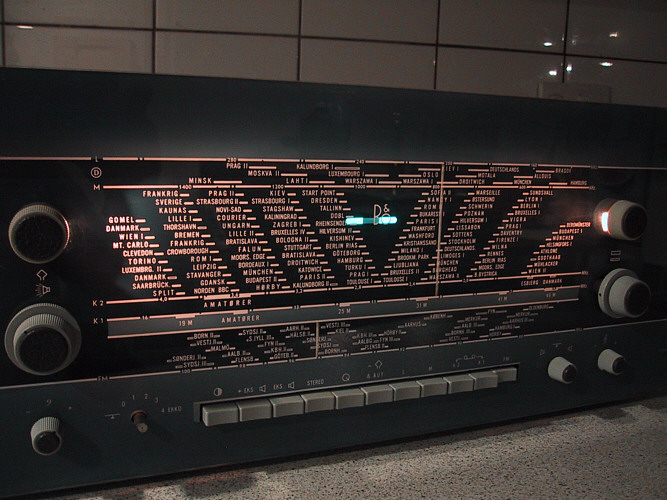
Martin
|
|
-
-
 Dillen
Dillen
  - Joined on 02-14-2007
- Copenhagen / Denmark
- Posts 5,008

|
Re: Grand Prix Moderne Stereo 609
STEREO !
VALVE-STEREO !
Bang & Olufsen VALVE-STEREO !
-Though with germanium based MPX decoder, but still...
What a warm and pleasant sound and what a perspective !
My repairshop is equipped with a pair of Beovox 1700 speakers (with no
front covers to help spotting DC on outputs very fast).
I've heard them sound good before but never quite like this.
I sat down, amazed, and just listened to this thing for about half an hour
when it struck me that I would have to connect other speakers - better speakers
or maybe just contemporary speakers - before eventually selling it.
But first I wanted to put it back together.
It somehow deserved to be in one piece again.
In between working on the electronics of this Grand Prix and some
other repairs that arrived here, I managed to find a little time to work on the
cabinet.
A light grinding, very fine sanding, ending with fine steelwool and finally a
good polish.
As expected, I wasn't able to remove all traces of the marks on top but they
are no longer the first thing you notice and that's good enough for me.
After all, I wasn't going to rob the set of it's history but merely make
the best of what it had.
Not quite as shiny in real life as in the camera flash, still missing a knob
and very hard to photograph with everything mirroring in the now
polished front surface but still IMO an improvement from what we started with.
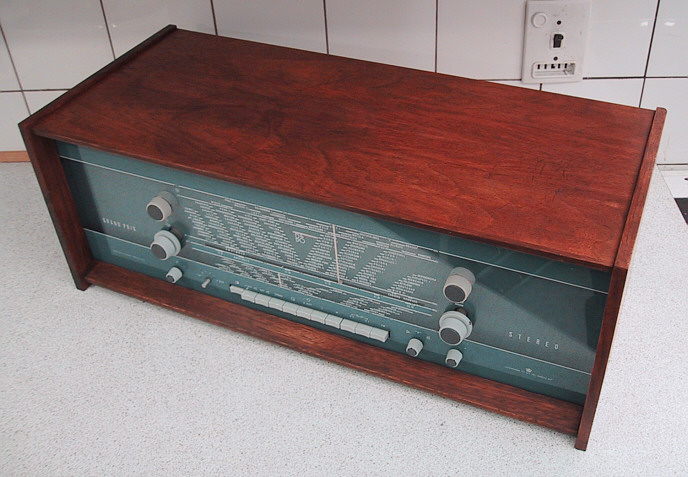
Martin
|
|
-
-
 yachadm
yachadm
 
 - Joined on 06-24-2007
- Jerusalem, Israel
- Posts 687

|
Re: Grand Prix Moderne Stereo 609
Very
Very Very
Very Very Very
NICE!!!!
Learn from the mistakes of others - you'll not live long enough to make them all yourself!
|
|
-
-
 Friedmett
Friedmett
 
 - Joined on 04-28-2007
- Herning, Denmark
- Posts 840

|
Re: Grand Prix Moderne Stereo 609
Very nice does not cut it.
It's art and Dillen has done it again. Making it come alive!
Really awesome. How about some sound clips like last time?
It's an honor to follow your repair threads but hey you know that allready.
Thumbs up. Any idea for the next B&O to service in public like this?
|
|
-
-
 burantek
burantek
  - Joined on 05-04-2007
- SE USA
- Posts 6,214

|
Re: Grand Prix Moderne Stereo 609
Kudos from me too!
Looks fantastic!
Another one saved. 
|
|
|
|
|